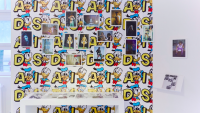Our Heart Is a Foreign Country - Friendship as an alternative in a normal world
2016
Participants: Pauline Boudry & Renate Lorenz, Anetta Mona Chişa & Lucia Tkáčová, Elmgreen & Dragset, G. B. Jones & Bruce LaBruce, Rodolf Hervé, Tamás Király, pr group, Karol Radziszewski, Andi Schmied, Lilla Szász, Ryan Trecartin, Jana Želibská
Our Heart Is a Foreign Country presents the intimate field of play that unfolds in friendships; a place that offers the possibility of departing from the expectations, ideals and norms constructed by society. The show gives a peek into the mysterious universe of role shifts and mischief that lies beyond the normative spheres of political control, the law, the church, and the family that is responsible for passing on cultural patterns. At the same time, it points to the liberating power of this versatile and flexible mode of human connection in a culture where modes of experiencing love and intimacy are determined by moral codes, institutionalized rituals and the legal framework of marriage. Our Heart Is a Foreign Country asks the question of whether friendship can be a way of life and the basis for a queer politics. It raises the question, can we consider friendship an alternative to the heteronormative social structures that enforce unequal power relations?
Friendship is the smallest unit of society, and as the most honest and equal bond between two people, it has a history of many centuries in Western philosophy. Although the social sciences, focusing on large-scale social structures, have ignored the emotionally charged field of the private sphere for a long time, and therefore did not give much thought to the significance of friendship. However, it is precisely within the four walls of the home that social trends and the formal and informal norms of culture become part of daily practice. Candle-lit dinners, family wellness discounts or Valentine’s Day cards are perfect examples of the way private lives and capitalist modes of production are closely tied together. And if we think of the legal bonds of marriage, the heterosexual institution created in the name of eternal loyalty, it becomes even more evident that the private sphere is not at all free from cultural norms and well-established, prescriptive patterns. Due to its versatility and flexible nature, friendship is the only form of human relationship that escapes the normalizing forces of religious rituals, political control, the economy, the law, and the family that passes on patriarchal role models. Not surprisingly, it has therefore proven ungraspable for sociology for a long time. At the same time, it is this institutional freedom that turns friendship into a pure relationship that exists for itself. According to British sociologist Anthony Giddens, such a relationship, based on equality and dialogue, can live up to the ideal of democracy in modern societies.
Friendship is an alternative reality that is free from predetermined purposes, and whose participants can always rewrite its rules and roles with the same ease they created them with. In addition to this, friendship based on the recognition of and continuous reflection on each other has a generative potential that enables the realization of both individual and shared visions. Australian sociologist Henry Blatterer likens the high level of creativity and madness (in the good sense of the word) present in this kind of relationships to an improvisational concert with multiple participants. Friendship means being ourselves through experiencing another human being, and therefore not only is it the purest manifestation of intimacy, but it also critically reflects upon the normative institutions of love that are not always — or only partially — able to live up to the universal promises attached to them.
The exhibition moves beyond the intimate unit of the private sphere and points out that friendship as a way of life also carries the potential of political resistance. This is because the collective practice of continuously questioning roles and behavioral patterns dictated by society can have a subversive force and contribute to the gradual rethinking of readily given values. Not only does friendship emerge in feminist critique as a possible answer to patriarchal social structures, but it also presents an alternative for homosexuality. In a 1981 interview, Michel Foucault explains that the basis of social taboos surrounding homosexuality is precisely that we have realized one form of sexual identity that we stubbornly stick to. While the gay rights movement emphasizes the political relevance of entering the public sphere, that is, the normalization of gays’ and lesbians’ mode of relation, the French philosopher saw potential in the fact that homosexual forms of life defy representation. As it lacks a canonized cultural and historical past, this way of life — up until the legalization of gay and lesbian marriages in the 2000s — was only loosely connected to the behavioral norms and cultural routines that the private sphere is interwoven with. According to Foucault, if homosexuality proceeds in the indefinable direction of friendship, it opens up the possibility of experiencing the wide range of relations that can exist between two people and generate pleasure. He describes a relationship that is yet to take form, that has to be invented from beginning to end, and in which emphasis is shifted from sexuality to possibilities. Through this, he conjures up the image of a queer politics, one that finds its allies along the lines of force that tie together in an unforeseen manner within the amorphous space of friendship.
Text written by Gyula Muskovics
Curated by Gyula Muskovics and Andrea Soós
Venue: FKSE, Studio of Young Artists’ Association, Budapest, Hungary
Supported and commissioned by tranzit.hu Budapest





